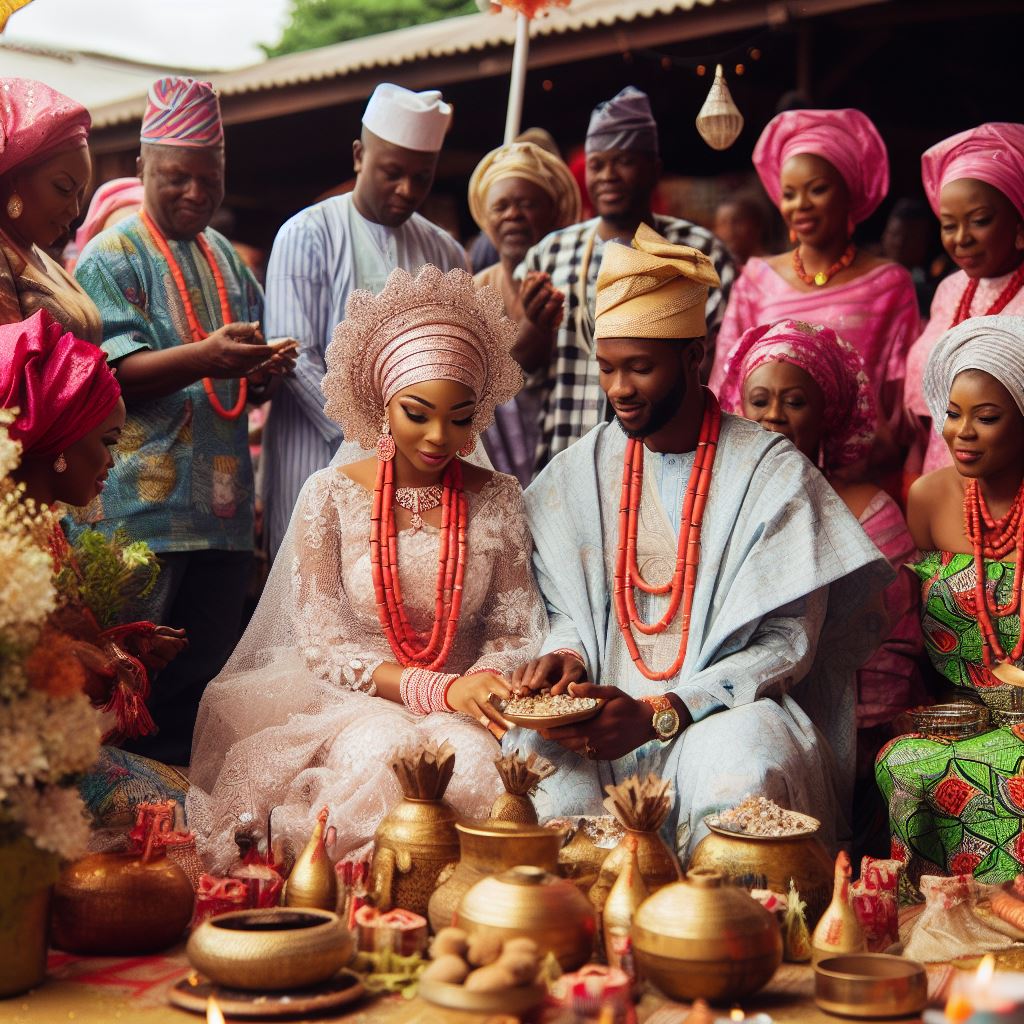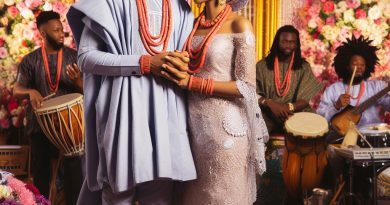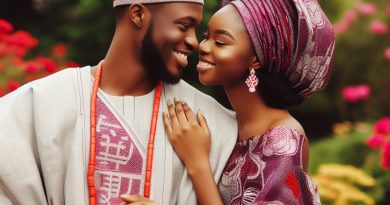Arranged vs. Love: Navigating Marriage Choices in Nigeria
Last Updated on October 13, 2023
Introduction
Overview of marriage in Nigeria
Marriage in Nigeria holds great significance as a cultural institution. It is much more than a union between two individuals; it is a bond that extends to families and communities.
Nigeria’s diverse ethnic groups bring unique traditions and customs to the institution, making it a rich tapestry of cultural practices.
The topic of arranged vs. love marriages in Nigeria
When it comes to choosing a life partner in Nigeria, two distinct approaches exist: arranged marriages and love marriages.
Arranged marriages involve parents, elders, or matchmakers playing a central role in selecting a suitable spouse.
On the other hand, love marriages are based on personal feelings and preferences, allowing individuals to choose their partners without external influence.
In this blog post, we will examine the advantages and disadvantages of both arranged and love marriages in Nigeria.
We will delve into the social, cultural, and economic factors that influence these marriage choices.
By doing so, we hope to gain an understanding of the complex dynamics that shape marital decisions in Nigeria.
Whether arranged or love, marriage remains a cornerstone of Nigerian society, and exploring different perspectives will help us navigate the challenges and celebrate the joys of marriage in this vibrant country.
Read: Marriage and Divorce: What the Bible Really Says
Arranged Marriages in Nigeria
Definition and Explanation
Arranged marriages, deeply embedded in Nigerian culture, are a matrimonial practice where parents or elders play a pivotal role in selecting life partners for their children.
This process involves careful consideration of compatibility, family background, and shared values. Arranged marriages aim to foster strong family ties and preserve cultural traditions.
Historical Context
To comprehend the significance of arranged marriages in contemporary Nigeria, it’s crucial to delve into their historical roots.
Historically, these unions served as more than just matters of the heart; they were strategic alliances aimed at strengthening bonds between families and communities.
These unions ensured the preservation of customs, traditions, and social structures.
Cultural Factors
Cultural factors wield substantial influence in the prevalence of arranged marriages. Nigeria’s rich tapestry of cultures and ethnicities leads to diverse practices.
Strong family ties, the desire to uphold ancestral customs, and the belief that elders possess wisdom in choosing suitable partners all contribute to the continuation of arranged marriages.
Advantages and Disadvantages
Arranged marriages offer stability, as families strive to ensure compatibility and shared values. However, they may limit individual choices, potentially overshadowing personal preferences.
These unions strengthen family bonds but sometimes at the expense of individual autonomy.
Case Studies and Anecdotes
Examining real-life case studies and personal anecdotes provides a window into the intricate dynamics of arranged marriages in Nigeria.
These stories unveil the unique challenges and rewards faced by couples navigating the intersection of tradition, family expectations, and personal aspirations within the context of arranged marriages.
Read: The Song of Solomon: Exploring Love and Marriage
Love Marriages in Nigeria
Definition and explanation of love marriages
Love marriages in Nigeria refer to unions where individuals choose their own partners based on love and affection rather than being arranged by their families.
In this type of marriage, the couple’s personal feelings towards each other are the foundation of their relationship.
Influence of Western culture and globalization on love marriages in Nigeria
With the advent of Western culture and globalization, the concept of love marriages has gained popularity in Nigeria.
This is mainly due to the exposure to Western media, especially through television shows and movies, which portray love marriages as a desirable and romantic choice.
Changing attitudes towards love marriages in modern Nigerian society
In modern Nigerian society, there has been a shift in attitudes towards love marriages.
Younger generations are more inclined to choose their own partners based on love and compatibility, as they believe in the importance of personal happiness and fulfillment in a marriage.
This change is also influenced by increased exposure to education and awareness about individual rights and gender equality.
Advantages and disadvantages of love marriages in Nigeria
Advantages
- Emotional connection: Love marriages provide the foundation of a strong emotional bond between partners, promoting trust and intimacy.
- Compatibility: Couples have the opportunity to choose partners based on shared values, interests, and goals, increasing the likelihood of a successful and harmonious relationship.
- Personal fulfillment: Love marriages allow individuals to marry someone they genuinely love, leading to a sense of personal happiness and satisfaction.
Disadvantages
- Family disapproval: Love marriages can be met with resistance and disapproval from traditional-minded families who prioritize arranged marriages for cultural or social reasons.
- Social stigma: In some communities, love marriages are regarded as unconventional and may subject the couple to social judgment and exclusion.
- Unrealistic expectations: The romanticized idea of love in marriages can lead to unrealistic expectations, and if unmet, could result in disappointment and marital conflicts.
Case studies or personal anecdotes related to love marriages in Nigeria
- Mariam and Ibrahim: Mariam and Ibrahim defied their families’ wishes for arranged marriages and chose to marry each other out of love.
They have a strong and supportive relationship, proving that love marriages can be successful and fulfilling. - Fatima’s struggle: Fatima fell in love with a man from a different tribe, facing immense opposition from her family.
Despite their love, the couple faced numerous challenges due to societal pressure and ultimately decided to separate.
Love marriages are gaining popularity in Nigeria due to the influence of Western culture and changing attitudes in society.
While they offer emotional connection and personal fulfillment, they also come with challenges such as family disapproval and societal stigma.
Personal anecdotes highlight the experiences of individuals who have navigated the complexities of love marriages in Nigeria.
Read: Biblical Foundations: Building Strong Marriages in Faith

Navigating Marriage Choices in Nigeria
Factors to Consider When Choosing Between Arranged and Love Marriages
- Personal preferences, including feelings, compatibility, and attraction, play a significant role.
- Family background, religion, and cultural traditions can heavily influence the choice of marriage.
- Socioeconomic factors, such as financial stability and social status, may also impact the decision.
- Commitment, trust, and shared values are crucial considerations for a successful marriage.
- Evaluating long-term compatibility ensures a foundation for a fulfilling and lasting relationship.
Family and Societal Pressures in Marriage Choices
- In Nigeria, families often exert substantial influence over the choice of a life partner.
- Traditional beliefs and societal expectations place importance on family honor and respect.
- The fear of social stigma can drive individuals to marry within their social and ethnic communities.
- Family pressure can lead to emotional conflict between personal desires and societal expectations.
- Resisting family pressure requires open communication and assertiveness in expressing personal choices.
Role of Personal Preferences and Compatibility in Marriage Decisions
- Personal happiness and emotional fulfillment should be prioritized when choosing a life partner.
- Shared interests, values, and goals create a strong foundation for a successful and harmonious marriage.
- Having mutual respect and understanding enhances the ability to navigate challenges together.
- Compatibility in lifestyle choices, communication styles, and decision-making processes is vital.
- Considering personal preferences ensures a relationship that aligns with individual needs and desires.
Practical and Emotional Considerations When Making Marriage Choices
- Financial stability and career aspirations should be assessed in the context of a potential marriage.
- Evaluating emotional readiness, maturity, and the ability to handle the responsibilities of marriage is essential.
- Discussing family planning, parenting styles, and household roles fosters a healthy foundation.
- Assessing willingness to compromise, forgive, and adapt to change promotes marital satisfaction.
- Considering both practical and emotional aspects ensures a well-rounded decision-making process.
Tips for Individuals Navigating the Complexities of Marriage Choices in Nigeria
- Reflect on personal values, goals, and aspirations to determine what matters most in a life partner.
- Seek advice from trusted individuals who can provide guidance and support.
- Take time to understand and communicate expectations and beliefs with a potential partner.
- Learn about each other’s families and consider how they may impact the relationship.
- Listen to your intuition and make choices that align with your true self and future happiness.
By considering the factors, personal preferences, societal pressures, and practical aspects, individuals can navigate the complexities of making marriage choices in Nigeria.
It is a deeply personal decision that requires careful evaluation to ensure a fulfilling and successful lifelong partnership.
Remember, the path to a happy marriage is different for everyone, and embracing one’s unique journey is key to finding lasting happiness.
Read: God’s Plan for Marriage: Rooted in Biblical Scriptures
Conclusion
Recap of the main points discussed in the blog post
- Arranged marriages and love marriages are both prevalent in Nigeria.
- Arranged marriages focus on compatibility, family approval, and cultural traditions.
- Love marriages prioritize emotional connection, personal choice, and individual happiness.
- Understanding both types of marriages is crucial for navigating marriage choices in Nigeria.
Importance of understanding both arranged and love marriages in Nigeria
By recognizing the values and benefits associated with each type, individuals can make informed decisions about their own marriage choices.
It is essential to appreciate the cultural significance of arranged marriages while also valuing the emotional fulfillment that love marriages offer.
Choosing a marriage partner should not solely be influenced by societal expectations or personal desires.
Rather, individuals should consider their own values, beliefs, and compatibility with a potential spouse to create a fulfilling and lasting relationship.
Sign off with a thought-provoking question or call to action for further discussion or exploration of the topic:
How can we strike a balance between tradition and personal agency in the context of marriage choices in Nigeria?


